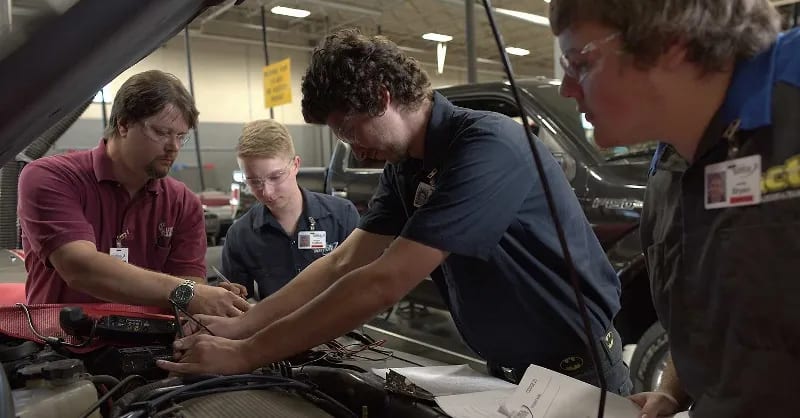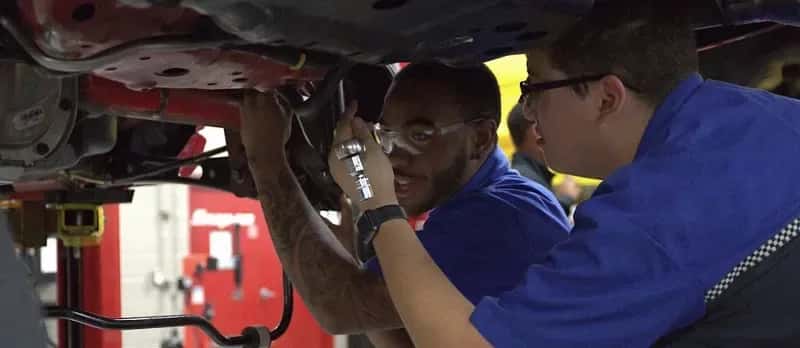There are more than 276 million vehicles on the road in the United States, a number that has been steadily increasing since 2017, according to Statista. All those vehicles must be properly maintained so they can safely operate and get drivers to where they need to go. Auto mechanics inspect cars, maintain vehicles and fix car problems to get them back on the road for safe operation for their clients.
If you have an interest in these machines upon which so many people rely for work and everyday life, a career as an auto mechanic could be for you. Use this guide to learn the answer to what an auto mechanic is, what an auto mechanic does, a typical day in the life of an auto mechanic, types of auto mechanic jobs, auto mechanic salary information and how to become an auto mechanic.
Auto Mechanic Job Description
Auto mechanics repair cars and light trucks used for everyday transportation. They may also be called auto service technicians, service technicians or service techs.
Auto technicians may fall into different categories based on their specialty. For example, service technicians might be:
- Automotive air-conditioning technicians who install and repair air conditioners and parts, and are trained and certified in handling refrigerants.
- Brake technicians who diagnose brake system problems and repair brake systems.
- Drivability technicians who diagnose engine efficiency problems using electronic testing equipment and on-board diagnostic systems.
- Front-end technicians who specialize in front-end work regarding tire wear, ride and handling problems.
- Transmission technicians and rebuilders who work on transmission parts like gear trains, hydraulic pumps and couplings.
Most auto mechanics work for automotive dealers or in the automotive maintenance and repair industry. According to the U.S. Bureau of Labor Statistics (BLS), 33% of auto technicians in 2019 worked for dealerships while 27% worked in automotive mechanical and electrical repair and maintenance. About 8% of auto mechanics in 2019 worked for automotive accessories, parts and tires stores, or at gasoline stations.
Many mechanics are also their own bosses. In 2019, 13% of mechanics were self-employed.
Most auto mechanics work full-time. Many work nights or weekends, depending on their clientele or operating hours. Most auto mechanics are standing most of the day, so they must be able to meet the physical demands of the job to succeed.
Typical Auto Mechanic Job Duties
Wondering what a day in the life of an auto mechanic is like? Typically, auto mechanics:
- Inspect vehicles to identify problems, often using computerized diagnostic equipment to do so
- Carry out maintenance tasks like changing a vehicle’s oil, swapping out air filters, rotating tires, checking fluid levels, and testing parts and systems for proper operation
- Replace or repair worn parts such as sensors, wheel bearings and brake pads
- Perform repairs
- Communicate problems and recommendations to clients

Auto mechanics must have knowledge of how to use tools, including wrenches, pliers, ratchets and sockets. Auto technicians must also be familiar with computerized diagnostic tools and power tools like welding torches, pneumatic wrenches, lathes, and jacks and hoists.
Auto mechanic duties are constantly evolving due to new vehicle developments. Examples are the increasing prevalence of electric vehicles and cars that use alternative fuels, including ethanol.
As vehicle technology advances, auto mechanics must also have an expert understanding of electronic systems primarily controlled by electronic components and computers. These may include braking, steering and transmission systems.
How Much Do Auto Mechanics Make?
In May 2024, the median annual salary for auto mechanics was $49,670.25 This means half of automotive technicians earned more and half earned less. Keep in mind that salary depends on several factors, including experience, employer, demand and cost of living in the area.
Some experienced auto mechanics who work for shops or dealerships receive a commission related to the labor cost. This is known as “flat rate” or “flag rate,” which means weekly earnings are determined based on the amount of work completed. Some repair shops pay auto mechanics an hourly rate.
How to Become an Auto Mechanic
According to the BLS, typical entry-level education for auto mechanics is a postsecondary nondegree award. Once the person is employed, they must usually obtain industry certification. The standard credential for service technicians is a certification from the National Institute for Automotive Service Excellence (ASE).
To become ASE-certified, a technician must have at least two years of experience or relevant schooling plus one year of experience and pass an exam. Attending an ASE Education Foundation accredited auto program like HomeUniversal Technical Institute (UTI)16 counts toward becoming ASE-certified.
For those who want to work in a dealership, there are automotive specialized training programs available. Often, dealerships recruit graduates from these programs because the programs focus on the type of vehicle in which the dealership specializes. The Manufacturer-Specific Advanced Training (MSAT) programs offered by UTI include:
- BMW FastTrack Program
- Ford Accelerated Credential Training (FACT)
- GM Technician Career Training
- Mercedes-Benz Drive15
- Mopar Technical Education Curriculum
- Porsche Technology Apprenticeship Program (PTAP)15
The Automotive Technology program at UTI prepares students for careers as auto mechanics.1 In the 51-week core program, students learn basic automotive skills, including automotive engine service and repair, professional automotive service writing, vehicle brake systems, and vehicle electronic systems. Students can participate in MSAT programs upon completion of the core program.
Want to Be an Auto Mechanic? Get Trained at UTI
UTI prepares aspiring automotive professionals with the education they need to succeed in the field. With financial aid like grants and scholarships available,10 you can start your education to move toward your dream career.
UTI’s auto mechanic program is available at campuses nationwide. Request information or enroll today.

